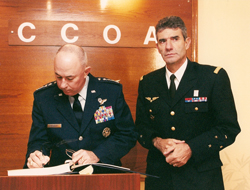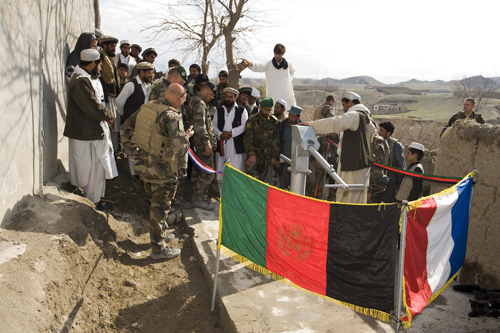
This is the first of a series of four articles on the subject of conflict management written by General Jean-Patrick Gaviard. General Gaviard was Commander of Air Defense and of Air Operations (CDAOA) in Taverny from 2003 to 2005 and advisor to the French Defense Minister in 2005 and 2006:
He currently works with the Paris-based French Air Force’s Center for Aerospace Strategic Studies CESA (Centre d’études stratégiques aérospatiales) and the Joint Defense Institute CID (Collège interarmées de defense); he is also an advisor to NATO’s Supreme Allied Command Transformation in Norfolk, USA. .
At a time when foreign military contingencies are becoming increasingly multinational and are most often held in conjunction and end with stabilization missions, General Gaviard ponders whether we should anticipate an exit strategy as soon as a crisis starts. The advantage of such planning is to find a potential solution to a conflict that could prevent military operations to turn into quagmires. Based on different types of conflicts (stabilization missions; urban guerillas; etc) and crisis situations (Afghanistan ; Conflict between Israel and Hezbollah ; Kosovo ; etc), General Gaviard tries to see to which extent such an anticipation is concretely possible and offers various tools to get there.
This first article addresses the concept of “Lead Nation” as part of the puzzle and describes the necessary conditions for a country such as France to keep playing such a role in the international arena, if that is its ambition.
***
Being A Lead Nation: The Conditions Of A National Ambition
Inhabitants of the Tagab Valley in the Kapisa province of Afghanistan join the French and Afghan armed forces
for the inauguration of the construction of a new bridge paid for by the Task Force La Fayette
and managed by a local company (Credit Photo: Sylvain Petremand, Combined Joint Task Force – 82 PAO,
Tagab Valley, Afghanistan, March 5th 2010)
Solving A Crisis: Towards A global Approach?
During the NATO Summit, the French president recently suggested to his foreign counterparts to use a “global approach” in order to solve the Afghan crisis. A global approach means taking into account all of the stabilization parameters of a country in crisis, which of course includes military aspects, but also reconstruction ones under the responsibility of civilian organizations only. Basically, it’s a way to perpetuate the results of a coercive military operation, which would otherwise disintegrate due to historical hatred as soon as the last enlisted soldier leaves. It is among other things his aspect of getting out of a crisis that makes the Afghan and Iraqi equations so difficult to solve. Today, a lot of work is being done regarding this global approach to crisis management, which rests on concepts of multinational and interdepartmental planning to be lead prior to any military engagement. France, as many of it allies, works hard at it.
However, this coherent approach does have its weaknesses. For instance, evacuations of citizens or natural disasters do require a very strong reactivity and yet, multinational planning necessitates long debates and cannot be applied easily to urgent crisis. The operation in Chad currently led by the European union was thus planned in the context of a global approach, but required weeks of discussions before a political consensus, followed by a long and arduous generation of forces process, was reached. On the contrary, the Artemis operation, which took place during the summer 2003 under European guidance in the Eastern region of the Democratic Republic of Congo, was planned and undertaken within a few weeks by France as the lead nation, with the positive outcome that we know of, especially regarding reactivity and speed of implementation.
The Concept Of “Lead Nation”: The Missing Part Of The Puzzle?
Thus, is this concept of “Lead Nation” the missing piece of the global approach? We have to distinguish two aspects. Even though the concept is advantageous operationally, it remains sensitive politically since it depends mainly on a single nation benefiting de facto from a delegation of command, which is always difficult to obtain.
The NATO Response Force is supposed to intervene on a very short notice. At the same time, the concept of the Battle Groups 1500 of the European Union is modeled on the same reactivity principle. However, the availability of forces on alert for the NATO or EU command is not automatic, and, worse, can be refused by some nations who had been nevertheless contributing at first. This can lead to a late involvement or, more damaging, to a lack of the necessary capabilities and therefore to operational incoherence. To sum up, a strong political will must come before any “global approach” and must be able to depend on the concept of Lead Nation in case of emergency.
Identifying The Right Capabilities
Once the political will has been clarified (what is the deep meaning of the mission?), we must look at capacities. Contrary to a strictly accounting perspective, it is not about having all the capacities in large numbers, but rather to concentrate on having enough of the “essential” ones to be able to lead operations under time constraint and sometimes far away.
France, which displays the ambition of being a Lead Nation, has to make choices in that direction:
- First of all, “strategic” capabilities, such as the ones provided by observation, intelligence and communication satellites are clearly essential;
- Command and Control capabilities are also unavoidable;
- Considering the need to cover long distances, air and naval means for strategic projection are also key elements;
- The capacity to plan and sustain the logistic support of a multinational force, as well as the capacity to “build” a support air or naval base are just as structuring.
Obviously, all those strategic capabilities must be fully interoperable. More standard capabilities based on platforms such as combat aircrafts, ships or armored vehicles, for instance, must be of the latest technology and in sufficiently high numbers to avoid being disqualified, in particular if the ability to be a Lead Nation is the goal. Finally, one must assess, via realistic engagement scenarios, the needed ratios for more classic capabilities, such as the size of land forces.
It is clear that the capabilities included in the program law for the 2009/2013 period will have to be filtered through this Lead Nation ambition, since our country, who is a permanent member of the Security Council of the United Nations, must be able to maintain its position to avoid losing all political credibility. This has to be achieved regardless of the political options that may be chosen by the Executive Branch.
———-
***Posted on April 14th, 2010



